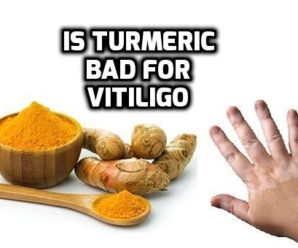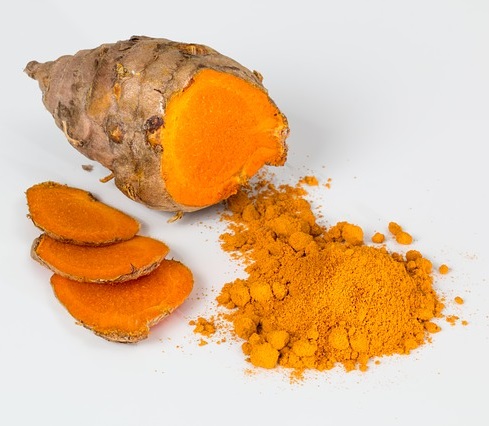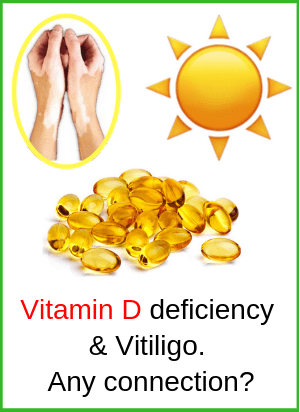
Is Turmeric (Curcumin) Bad for Vitiligo (Leucoderma)
No, turmeric is not bad for vitiligo, in fact, it is one of the most recommended natural supplements to control (manage) vitiligo symptoms. Curcumin, the main active component in turmeric, is a phytochemical with potent anti-inflammatory, antioxidant and immunomodulating properties. Phytochemical refers to naturally occurring plant chemicals with medicinal benefits.
In Ayurveda, the ancient Indian medicine system, turmeric is widely used to treat skin ailments, liver toxicity, digestive health problems, arthritis and fungal and viral infections. Not only Ayurveda, but, the modern medical science is also impressed by incredible health benefits of turmeric. That’s why, 7000 plus research articles have discussed the pharmacological actions of curcumin by 2015. (1)
The scientists are also evaluating the anti-cancer properties of curcumin considering its powerful anti-oxidant and anti-inflammatory properties. (2, 3) Thus, it is not just all hype, but, curcumin do possess some hard to ignore medicinal benefits.
If we summarize all the clinical trials conducted over the past half century, curcumin can help treat below health conditions (4):
- Autoimmune skin issues like vitiligo, psoriasis and scleroderma
- Arthritis
- Liver disorders
- Stomach ulcer
- Irritable bowel syndrome
- Crohn’s disease
- Indigestion
- Diabetes
- Various types of Cancer
- Alzheimer’s disease
How Turmeric is going to help with Vitiligo?

Vitiligo is an inflammatory autoimmune skin disorder where the faulty, uncontrolled immune system mistakenly attacks the pigment producing healthy skin cells to cause skin de-pigmentation in the form of white patches. The various possible causes of this unusual behavior of the immune system are:
- Chronic stress
- Poor gut health
- Liver impairment
- Faulty genes
- Oxidative stress
- Respiratory infections such as strep throat
- Skin injury
- Alcohol abuse
- Poor diet and disturbed lifestyle
The exact cause and hence, the cure for vitiligo is not known yet. However, alternative medicine systems such as Ayurveda and Naturopathy do offer some really good strategies to control the spreading of white lesions and in some cases, re-pigmentation can also occur to bring back some of the lost skin pigment.
I recommend a holistic approach combining Ayurveda, Naturopathy and modern medical science- a restricted, healthy diet along with a positive lifestyle and intelligent use of natural herbs and dietary supplements can really help control vitiligo symptoms to a large extent.
How turmeric would help here?
Well, the ‘star’ component curcumin has research backed evidences to target malfunctioning of the immune system in a natural way without any side effects.
- Inflammation is the root of all autoimmune problems and curcumin in turmeric is certainly the most powerful natural anti-inflammatory compound. (5, 6)
- Curcumin neutralizes the free radicals to reduce oxidative stress, inflammation and calm down the autoimmune response. (7, 8)
- Curcumin stimulates bile production in the liver and stimulates gallbladder contraction for smooth bile flow. The optimum bile production and flow would help in liver detoxification and improved digestion of fats. Use of curcumin to treat liver toxicity and liver damage are well documented. (9, 10, 11, 12, 13, 14)
- Curcumin reduces gut inflammation and assists in digestion of dietary fats and other complex nutrients to treat digestive system related discomforts such as heartburn, indigestion, gas, bloating, irritable bowel syndrome and peptic ulcer. (15, 16, 17)
- The overgrowth of bad microbes in the gut worsens autoimmune reaction. The anti-fungal and anti-viral activity of curcumin helps to eliminate the bad microbes (intestinal worms) to relieve autoimmune response. (18)
- The immunomodulating activity of curcumin modifies the autoimmune response to reduce the skin depigmentation attack. (19, 20, 21)
Read more: Turmeric for Liver health and perfect digestion
Curcumin can reduce methotrexate related side effects
Methotrexate tablets are widely prescribed immunosuppressants to suppress the immune system temporarily and prevent skin de-pigmentation. However, regular use of methotrexate has side effects on the human body such as liver toxicity, loss of appetite, poor digestion, hair loss and joint pain.
Curcumin being an immunomodulator has similar action to methotrexate without side effects. Also, it has a protective action against the harmful effects of methotrexate on the liver and digestive system. (22) To further explore the immunomodulating properties of curcumin, researchers use curcumin in combination with reduced dosage of methotrexate and found good results in treating autoimmune disorders. (23)
Who said that turmeric is bad for vitiligo?
If turmeric has so many health benefits for vitiligo management, then why the hell this question has popped up that turmeric can be bad for vitiligo?
Well, I enquired for the same and found a single research study where the researchers at the University of Bradford, Bradford, UK observed that curcumin increased oxidative stress in a group of 15 people with vitiligo instead of reducing it. (24) Thus, they concluded that people with vitiligo should stay away from turmeric.
For me, a single research study cannot over weigh the 4000 years long history of medicinal uses of turmeric. For those who don’t know, turmeric is a curry ingredient in India and millions of Indians consume it on a daily basis in their curries and other food preparations. So, a small clinical trial with a sample size of 15 people is not enough to label turmeric as ‘bad’ for vitiligo.
The bottom line
Curcumin is incredibly beneficial for all autoimmune skin problems including vitiligo and it cannot harm you unless you overdose it. (25)
The optimum curcumin dosage per day is 1200-1400 mg. So, buy a good quality curcumin supplement and consume it for a period of 10-12 weeks along with a healthy diet and positive lifestyle and observe the difference.
If you are curious that why I am recommending curcumin extract capsules instead of raw turmeric powder, then, let me tell you that curcumin is only 3% of the total turmeric weight. Thus, 1200 mg of curcumin would be equivalent to almost 40 grams of raw turmeric powder. This is too much to consume every day. That’s why curcumin extract capsules are the best choice.
Pregnant ladies, breastfeeding women and kids (below 12 years) should consult a registered medical practitioner before taking curcumin supplement. Also, people dealing with kidney stone, gallstone, serious medical conditions and those consuming blood thinning medicines would need prior consultation with their doctors.
Always buy the right curcumin extract product that contains piperine (black pepper extract) in it. Actually, piperine increases bio-availability of curcumin otherwise most of it would get destroyed during the digestion itself. Piperine ensures that the maximum amount of curcumin reaches the blood stream to provide medicinal benefits. (26, 27)
Buying instructions
Check below Amazon links to buy organic curcumin extract capsules of a reputed brand:
If you are from USA, click here
If you are from India, click here
If you are from UK, click here
Note: Daily dosage is 1200 mg and take capsules with warm water after the meals.




I have vitiligo and ate meals with some turmeric from time to time. Probably twice a week on average. I have my vitiligo under control and it doesn’t spread mostly by avoiding dairy. Until one time I had a Thai pineapple fried rice with HEAVY turmeric in it. I could taste the powder it was so heavy. The next day I had a lot more spots. At least in my case turmeric is not healthy for my vitiligo. Normally I get pineapple fried rice at other Thai restaurants with no issues.
So as you pointed out don’t overdose on it. But if a lot made my vitiligo spread quite a bit then there is a good change the study has validity to it.